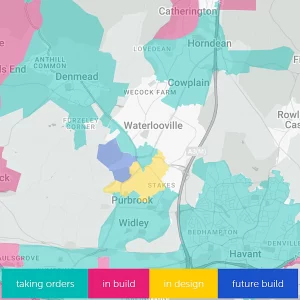Sponsored Links
UK Project Canvas Open Broadband TV Standard Gains Significant Support
Posted: 10th Sep, 2010 By: MarkJ
 The controversial Project Canvas (YouView), which claims to be developing an open standard for delivering subscription-free broadband ISP based internet TV ( IPTV ) services, has won more support from 40 consumer device manufacturers.
The controversial Project Canvas (YouView), which claims to be developing an open standard for delivering subscription-free broadband ISP based internet TV ( IPTV ) services, has won more support from 40 consumer device manufacturers.Canvas, which is already under pressure after Virgin Media lodged an official competition complaint with Ofcom last month (original news), will ultimately be delivered directly into homes via special £100-£200 PVR (Personal Video Recorder) style set-top-boxes.
Richard Halton, Director of Project Canvas, said:
"The response from industry has been phenomenal, and we’re really excited by the strong desire to work with Project Canvas to bring internet-enabled set-top-boxes and TVs into people’s homes next year. For us, this is a great endorsement of our open approach to working with industry partners.
Consumers need the assurance that they will get the best experience, whatever device they buy. This industry engagement programme will ensure that high standards of quality will be deep rooted throughout all of our supported products. We look forward to working with further manufacturers as we roll out more phases of this programme."
"The response from industry has been phenomenal, and we’re really excited by the strong desire to work with Project Canvas to bring internet-enabled set-top-boxes and TVs into people’s homes next year. For us, this is a great endorsement of our open approach to working with industry partners.
Consumers need the assurance that they will get the best experience, whatever device they buy. This industry engagement programme will ensure that high standards of quality will be deep rooted throughout all of our supported products. We look forward to working with further manufacturers as we roll out more phases of this programme."
It's understood that Canvas will now evaluate the responses from consumer device manufacturers and select several, which will then be taken through to the next evaluation stage; most likely by the end of September 2010. Canvas has also released related technical documents on its web site, under the 'Industry and Technology' section.
Despite competition concerns, Project Canvas and its Joint Venture (JV) partners ( BBC, ITV, BT, Channel 4, TalkTalk, Arqiva and Five) are still pressing ahead with plans to become "incorporated this Summer". That doesn't give them long, autumn is about to begin.
Last week we reported on a new Opinium Research survey of over 1,500 adults in the UK, which found that only 35% believed Project Canvas is a good idea. Some 51% of those were waiting to see if it catches on before buying it and 19% said they were usually one of the first of their friends to buy new tech.
Search ISP News
Search ISP Listings
Search ISP Reviews
Latest UK ISP News








Cheap BIG ISPs for 100Mbps+
150,000+ Customers | View More ISPs
Cheapest ISPs for 100Mbps+
Modest Availability | View More ISPs
Latest UK ISP News
Helpful ISP Guides and Tips
Sponsored Links
The Top 15 Category Tags
- FTTP (6798)
- BT (3881)
- Politics (3074)
- Business (2766)
- Openreach (2663)
- Building Digital UK (2512)
- Mobile Broadband (2475)
- FTTC (2142)
- Statistics (2127)
- 4G (2092)
- Virgin Media (2024)
- Ofcom Regulation (1779)
- 5G (1732)
- Fibre Optic (1604)
- Wireless Internet (1595)
Sponsored
Copyright © 1999 to Present - ISPreview.co.uk - All Rights Reserved - Terms , Privacy and Cookie Policy , Links , Website Rules































